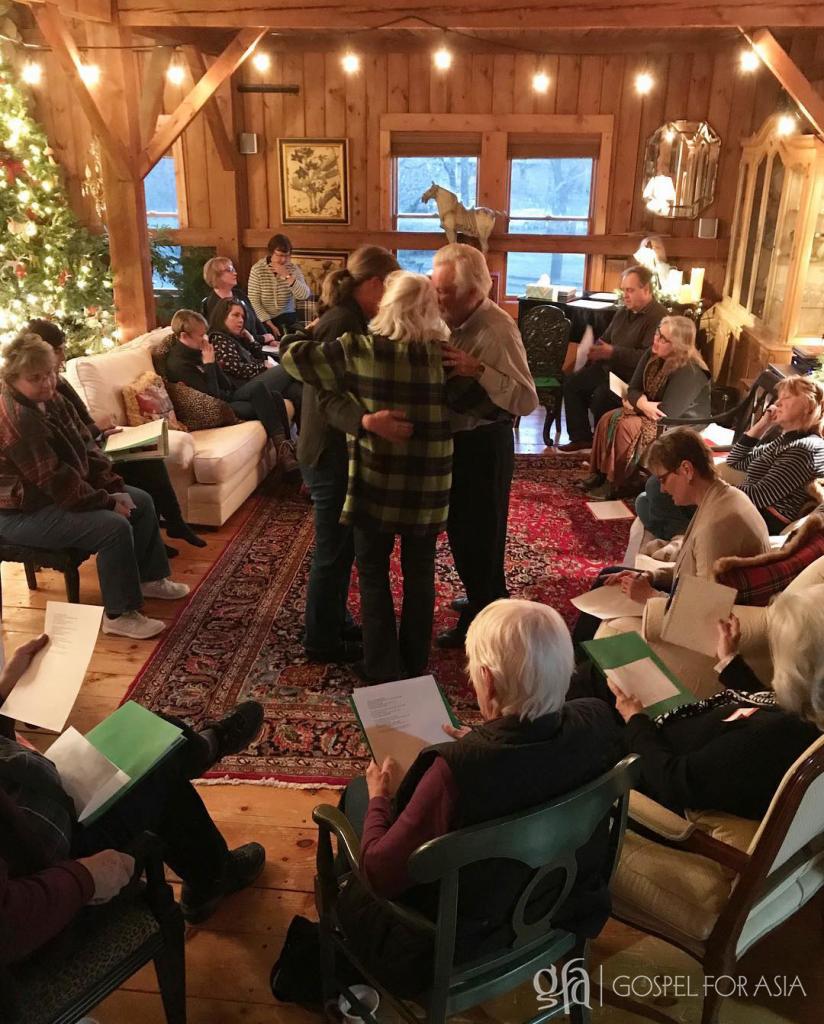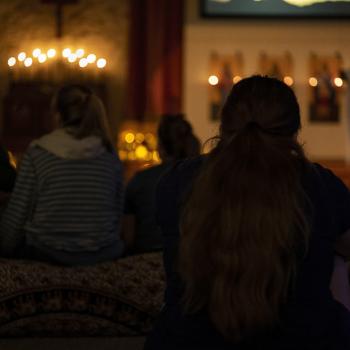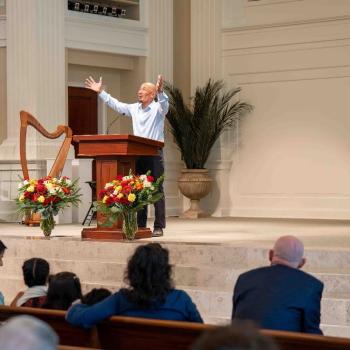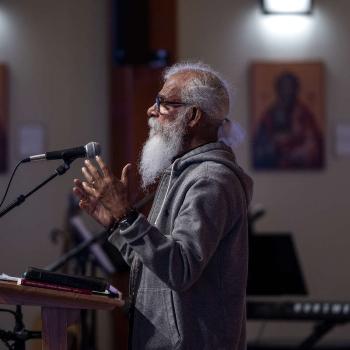Almost every year for the last 14 years, I have offered a 24-hour Advent retreat of silence during the first week of December. Advent, on the liturgical calendar, is the beginning of the church year that follows the life of Christ for 12 months. This retreat felt like a perfect way to begin centering the minds of Christ-followers and provide a decent antidote, if taken, to protect against the consumerism, the commercialism and the secularism of the world that surrounds us. It’s easy to be sucked into all that, if we’re not careful.
For me, the Advent retreat is always a gift of love. I generally come home after it ends, physically blasted from hauling and designing and interacting. Nothing in my home speaks of Christmas, and often, by early December here in Chicago, some early snow and dropping temperatures mean that the barrel by the mailbox, which I always decorate, including some message for passersby, will be frozen. This fall, corn shocks and wild grasses, dried allium heads and pumpkins and gourds and three signs proclaiming “Count Your Blessings” and “Give Thanks” adorned the barrel beneath the postal box. As I anticipated, two snowfalls have come this year, and the weather is 10 degrees outside. Everything is frozen, and I will have to carry buckets of boiling water across the street in order to dislodge the now rather sad-looking arrangement.
This year, we held four (four!—what were we thinking?) 8-hour Advent retreats of silence in the 1920s restored barn-house of my daughter and son-in-law, Melissa and Doug Timberlake. Something about this place embraces people. It has been beautifully decorated with garage-sale finds. The high lofts (which are great for people to tuck into and to go deeply into silence) lift the eyes. There are all kinds of nooks and crannies where people can sit and be still, where they can follow the guided instructions we work hard to create, where they can pray and listen in the silence.
However, it takes about a month to hang Christmas decorations in this huge place. Since we are not going to a retreat center with paid staff—crews that set up and tear down and clean up after the retreatants leave—we are the ones on whom all this work lands (and more so, on my daughter, Melissa, and her family, since this is their home).
For our recent retreats, treats needed to be prepared and arranged on two coffee-and-tea bars, and a hot-chocolate center in the basement needed to be readied with homemade cookies (everything gluten-free due to guests’ dietary constraints), carafes to hold hot milk, and various kinds of powered chocolate to make the drinks.
The barn needed to be cleaned, stalls mucked—one horse and three sheep and a stall full of chickens all contributing to the task. Due to guests’ allergies, cats were stored in a room in the basement, and two Great Danes and an aging shih tzu named Supreme were temporarily kenneled at our home, some 50 minutes away, while two young-adult Timberlake grandchildren supervised this arrangement for the four days, two Thursdays and two Saturdays early in December.
Why go to all this trouble? (May I also mention that the fees for the retreat just barely covered the expenses.) It is worth the effort and the resulting fatigue when, as a retreat leader, you feel that movement of silence settle on the house and on those who are inhabiting it for eight hours, when people ooh-and-ahh about being quiet with so much surrounding beauty, when tears come due to the persuasion of the Holy Spirit and the power of the Scriptures and the chosen theme, and the reality settles in that we have so little time to simply be because of the cacophony and hurriedness of our modern living.
I went home after the first two retreats, sent the dogs back for four days before they returned again before the second stage of retreats, fought off a cold, slept for nine hours one night and took naps during the days but still felt that warm glow, which some have designated “helper’s high,” that I have felt after every Advent retreat I’ve ever offered. We may be tired from the effort, weary to the bone, but knowing that people have met with God, have heard Him speak, have faced some of their own personal dilemmas with a little more honesty due to the opportunity of uninterrupted self-reflection—that makes it all worth the time and energy and expense.
An interesting thing happened this year (perhaps it happens every year and I just noticed it more this year): I personally was deeply impacted by the Advent theme Melissa and I chose and our husbands, Doug and David, helped us develop. The theme was “Taking the High Road: The Courage to Choose Goodness in a Challenging World.” We had the opportunity to meditate on the meaning of goodness through August, September, October and November. David and I realized that we, in all our 57 years of marriage, had never heard a sermon series on the topic of what it means to be good or to serve a good God.
Our guided retreat program included quotes from religious thinkers. This one from Billy Graham struck me: “Man has two great spiritual needs. One is for forgiveness. The other is for goodness.” I deeply agree. And I have thought about this through these months.
The morning time of quiet began with a series of questions that encouraged an hour and a half of self-reflection. The theme Scripture started us: “Let us not become weary in doing good, for at the proper time we will reap a harvest if we do not give up. Therefore, as we have opportunity, let us do good to all people, especially to those who belong to the family of believers” (Galatians 6:9–10, niv). Two pages of scriptures with the concept of good or goodness were provided for all to examine. We asked the retreatants to look back over their lives and think about the people who had impacted them with goodness and what, in particular, it was that those people had done. We provided them with two pages of synonyms for “good”: a list of adverbs (acceptability, adequately, all right, decently, nicely, satisfactorily, etc.); a list of nouns (benediction, benefit, boon, felicity, godsend, blessing, grace, mercy, favor, kindness, comfort, consolation, etc.); a list of adjectives (right, decent, ethical, honest, honorable, just, moral, righteous, straight, true, upright, virtuous, etc.). We gave them time to debrief as the group gathered together what thoughts had come to them, what the Holy Spirit might have whispered to them, what kept them from doing good, being good. We asked them to set goals to become people who thought good, spoke good and determined to be good. We gave them things to do in the afternoon—activities, but still conducted in silence.
We ate our meal in silence, together, but not talking. A small poem at each plate further focused our minds on the meaning of goodness. A handmade bookmark contained different Scripture verses, and a collage of dried leaves from Turtle Creek Acres, the name of the Timberlake barn-house with some 15 acres of protected marshland surrounding it, was an individual gift for all.
We included this intriguing poem puzzle. Read it slowly down the page, and when you are finished, read it slowly up the page.
Today is the absolute worst day ever
And don’t try to convince me that
There’s something good in everyday
Because, when you take a closer look,
This world is a pretty evil place.
Even if
Some goodness does shine through once in a while
Satisfaction and happiness don’t last.
And it’s not true that
It’s all in the mind and heart
Because
True happiness can be obtained
Only if one’s surroundings are good
It’s not true that good exists
I’m sure you can agree that
The reality
Creates
My attitude
It’s all beyond my control
And you’ll never in a million years hear me say that
Today was a good day.
By the time of our whole eight-hour day—arriving at 9 a.m., eating at 12:30, gathering at 4:00 for our last time of group debriefing, then concluding with an ending ceremony at 4:30, and saying goodbye at 5:00—we’d all had a full day. (“All of us” includes 44 retreatants, 4 leaders, 2 marvelous helpers and 1 musician—51 in all).
And most importantly, all of us, as testified by remarks at the door, left with minds surfeited with thoughts of goodness—its meanings, its capacities to work wholeness and health and beauty and reconciliation and redemption in the world. David has been writing letters to those people from our past life who influenced us in major ways for the good. We have a stack of red envelopes, some 30 of them, self-addressed by retreat guests, waiting for stamps: This an exercise of writing out those words we believe God might say to us—an assignment to help us experience “The Goodness of a Letter from God.” We will mail these back to the authors the week before Christmas.
We played the gospel-music song “Good, Good Father.”
David and I laid hands on each person at the end of the retreat and pronounced a blessing, “This is what your good, good Father says to you: ‘You are my beloved daughter [or son], in whom I am well pleased.’” People were powerfully moved. Tears flowed. We knew many of us had met with a good and loving God.
The last Advent retreat for 2017 was three days ago. I’ve slept and done the minimal things I need to do. Not one Christmas display has been put up in my house. The dining-room table with the white bisque angels set has not been laid with the holiday dishes. The lovely nativity I picked up in Alcala, Spain, has not taken its rightful place on the sideboard. The shepherd hooks will need to be pounded into the frozen ground so that lanterns will light the Christmas Eve path leading to our front door.
Nevertheless, I am celebrating Christmas in my heart. I have a good, good Father who teaches me to be good, instructs me when I forget to do good, inspires me by the example of others who are good, who sent His Son into the world—gave this extraordinary gift—so that we would know what good looks like and become like that good. As a gift, for the last 15 years, we’ve mounted an Advent retreat of Silence. And that’s a good thing. Because of all this inner work, we are going to have a good (perhaps undecorated) Christmas.
Remarkably, when I returned home, InterVarsity Press had sent me one of their just-released books as a Christmas gift, The Magnificent Story: Uncovering a Gospel of Beauty, Goodness & Truth by James Bryan Smith. One paragraph pierced my fatigue and the temptation to crankiness that accompanies the effects of overdoing: “‘Beauty,’ said Dallas Willard, ‘is goodness made manifest to our senses.’ What is goodness? Goodness is that which works for the benefit or betterment of another. If, as [Thomas] Aquinas said, beauty is that which, when seen, pleases, then goodness is that which, when experienced, benefits. That which is good makes us better, heals us, restores us, improves us, strengthens us, and makes us right, perhaps when we were wrong.”
All through this 2017 season of offering Advent retreats, I had been receiving text messages from a high school friend I hadn’t seen in 30 years. Traditionally, one of the satisfactory acts for me at this time of year is to provide gifts for others in real need. There is so much abundance in our lives—just living together as a loving married couple; just being privileged to serve our God in full-time ministry—that David and I don’t give gifts to each other, but we try to be aware of those around us who have little, who have had losses they still grieve and who struggle to make it through the days. However, this Advent season, I was tight financially myself and admittedly dubious about the concerns my long-ago friend was texting to me.
For years she had served as a missionary to Romania, and she returned home to the States to retire, bringing a young teenager she had adopted while in her late 60’s. Some of the young men she had once mentored in faith were now encountering dreadful circumstances, were ill and destitute, had been beaten by bullies . . . Her texts indicated how frantic she had become for them.
Finally, a royalty check came my way, and I attempted to send an electronic gift per my friend’s instructions to me. The woman at the fund transfer counter was skeptical: Did I know these people? she asked. No, I didn’t. She actually didn’t want to wire it; there were so many scams perpetrated by overseas hoaxes, particularly at this time of year. Not only was she practically refusing to service me, but this fund transfer group would not take my check, only a debit card, which David and I do not use. I had prayed about this need and was still confused about the legitimacy of the ask. But because I had told my friend I would wire funds—the whole of my small royalty—I procured her checking account numbers, went to a bank branch and sent the money on its way.
Word came back. A hospital bill was paid; medicine to combat pneumonia was procured; wood was purchased to heat a little cottage that had been made available; and a debt to a loan shark was paid off. Then another royalty check, a surprise, came in the mail, and I forwarded it, rescuing small children who had been taken as earnest against the loan shark’s loan. (Do these things really happen in the world? Apparently they do.) The two little children were released. I went to bed for a couple of days (or at least dragged around the house).
But—with Advent in our hearts, and charity (one of those synonyms for the word good) activated, despite not one Christmas decoration being in place outside or inside, we are already having a good, good Christmas. (“Really, really, really,” as my five-year-old granddaughter says.) Really. He is a good, good Father.
=====
Click here, to read more blogs on Patheos from Gospel for Asia.
Go here to know more about Gospel for Asia: GFA.net | GFA Wiki | GFA Flickr














